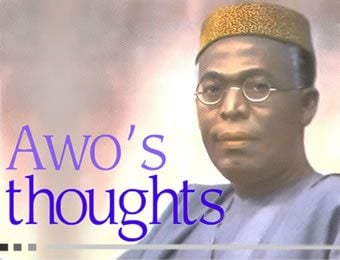IT has been contended that if this proposition were true, then it would follow that an illiterate peasant in the remotest part of Nigeria could become a millionaire by thinking that he can be a millionaire.
My answer is -yes, he can indeed – if only he passionately believes that he can. The trouble, of course, is that he can never generate enough confidence in himself to entertain the thought. Even if such thought perchance crossed his mind, he would regard it as a fantasy, and would quickly dismiss it. If he dared to nurse it to the extent of mentioning it to his fellow-peasants, they would dub him as a dangerous lunatic! It wouldn’t occur to the peasant and his neighbours that what Shakespeare says on this subject is eternally true, namely, that ‘Our doubts are traitors. And make us lose the good we oft might win, By fearing to attempt.’ The psychological truth must, therefore, be reiterated that when a person persistently entertains and cherishes a thought, such a thought, sooner or later, becomes manifested in real life. In due course, the methods of materializing the objects of the thought would occur to him, and he would feel an irresistible urge to employ them.
For any thought, however, to materialise for the good of the person who entertains and cherishes it, it must be such as can benefit not only himself but also others as well.
It is of extreme importance, therefore, that in order to accelerate our country’s development, and our individual advancement, we must entertain and cherish big ideas and great expectations. We must realise that we are what we are in this country today because of the mediocre, negative, selfish, and hateful thoughts we persistently entertained and cherished in the past, on practically all issues of public interest. If I were to marshall all the available evidence in support of this statement, I would need a whole chapter. It is useful, however, that I should refer to some recent examples of the kind of Lilliputian thinking which keeps us completely and tragically earthbound, in an age of space exploration and the moon landing.
When we launched our Six-year Development Plan in 1962, we envisaged a 4 per cent growth rate in our economy. The only reason assignable to this cramping limitation on our growth rate is that we slavishly chose to follow the precedents of poor countries like ours, and of countries like Britain and the United States which are already suffering from what Eric Roll, at page 504 of his A History of Economic
Thought, calls’ declining investment opportunity,’ ‘mature economy,’ or ‘secular stagnation.’ For reasons of lack of self-confidence, we refused to follow the examples of countries like Japan, USSR, and Yugoslavia which, for some years, have been progressing at a growth rate of about 10 per cent.
In its Report already referred to, the FAa estimated that we should increase our per capita GDP from £25 to £38 by 1980. So far, so good. It is certainly not the responsibility of the FAa to prescribe the size of our development target. But, compared with a Nigerian contributor to the Conference on National Reconstruction and Development in Nigeria” held in Ibadan in March this year, the FAa deserves to be eulogised. For, the Nigerian in question wanted us to plan for a rate of growth which would enable us to double our standard of living by 1985-that is, to have a per capita income of about £50 by 1985! In contradistinction to this, an expatriate contributor at the same Conference, Professor Glenn Johnson, estimated’ that Nigeria can be producing over three times its 1966 GDI:’ by 1985 ‘-that is, £75 per capita, which is a considerable improvement on both the FAa’S and the Nigerian contributor’s estimates, and an eloquent evidence of our utter lack of confidence in ourselves.
But, as I stated on page 20, I am of the opinion that “we can, and should endeavour to achieve more than double’ £38 per capita income by 1980 – that is, more than £76. I have no doubt that we can achieve more than this target – if only we believe, plan for the realisation of our belief, and do not allow the faithless and the chronic doubters to shake our belief or deter us from our onward march to our declared goal.
Yugoslavia rose from an underdeveloped to a developed economy inside twenty years, increasing its national income more than fourfold. In the same period, the USSR rose from semi-primitive economy to become one of the greatest world superpowers in every sense of the word. Also within the same period of twenty years, Japan shook herself free from medieval feudal system to become a highly modernised, developed, and internationally competitive economy. What these countries have done, we too can do-even better-if only we believe, and have supreme confidence in our ability to achieve the objects of our desire. For, be it remembered that, of the three countries mentioned here, only the USSR is blessed with vast and enormous natural resources, like Nigeria.
I do not, for one moment, minimise the magnitude, and the complicated and multifarious nature of the problems which the objectives, outlined in this book, pose. I readily concede that they admit of no easy or facile solutions. But, at the same time, I insist that, with burning faith in our objectives, with absolute confidence in our ability to succeed, and with rigorous and detailed planning, there can be no insuperable obstacle in our path to socialist bliss.
And to anyone who may still be tempted to doubt this claim, I commend the following much-quoted words:
‘The difficult we do immediately;
The impossible takes a little longer.’
For the inculcation in our people, therefore, of the attributes and attitudes of mind which we have discussed in this Section, I consider it desirable that an Institute of National Guidance should be established in the people’s republic of Nigeria.
This Institute would be manned by carefully selected persons who are first-rate experts in the fields of publicity, propaganda, and mass indoctrination. Among other things, it would be their paramount duty to conduct intensive research into the cultures, traditions, psychology, behaviour, habits, and other characteristics of our people, and, on the basis of their findings, to formulate the most appropriate and the most effective methods of guiding them along the paths which I have outlined above. For this same purpose, it would, in addition, be the duty .of the Institute, from time to time, to
(I) publish literature for use in primary schools and other educational institutions, in adult literacy classes, and in all places of work and employment;
(2) organise lectures, talks, debates, seminars, etc.;
(3) contribute articles to newspapers, magazines, and journals;
(4) issue guidelines to appropriate Ministries, and other public institutions;
(5) devise the most effective methods of explaining and interpreting government policies, plans, and programmes to the people; and
(6) employ, for its purposes, the desirable facilities provided by all the information media in the country.
When I addressed the Congregation of the University of Ife on 28 June this year I said inter alia as follows: ‘From September I, 1967 to the end of April this year, we have spent, without borrowing, an average of £6 million per month, in local currency alone, in waging the present civil war.
This amount does not include what we have spent, in foreign exchange, in buying military equipment, and what we have lost through physical destruction, and through the severe slowing down of our development efforts. Dr John D. Letiche, Professor of International Economics at the University of California in the United States, in an address given under the auspices of the Nigerian Institute of International Affairs, Lagos, on 26 September 1968, said in this connection as follows:
The growth rate in the last three or four years was approximately 5 per cent a year; with a population rise, say, of 21/2 per cent a year, that meant a capacity increase of 21 per cent a year Had this growth rate continued through the end of this year, the GNP potential of Nigeria would have been 5.6 billion dollars; it is at present, at most, 5.2 billion. In other words, Nigeria has lost income foregone of a minimum of 400 million dollars due to the civil conflict.
‘Into the bargain, we have spilt a large amount of one another’s blood through killing, wounding, and maiming. We have done and suffered all these things, in order to preserve the unity and territorial integrity of this great country of ours. It can, therefore, be said, without any fear of contradiction, that when this war shall have been won and the rebellion is totally crushed, and our people of the East-Central State become fully reintegrated with their fellow-Nigerian citizens, we shall have resealed Nigeria’s unity with a compound of our sweat, tears, and blood.’ I now want to add, for explanation, that what I have repeatedly described in this book, as The People’s Republic of Nigeria is the postwar Nigeria: united afresh-washed-purged-and purified-by the sweat and tears of our people in all walks of life, and, more particularly, by the blood of our youth, shed profusely-loyally-and patriotically-in the fields of battle. It is to that brave new Nigeria, of the great and glorious morrow, that I address the message of this book.
Appendix I
Estimated Cost of the proposed Education Development Plan in Nigeria 1971-1990
The cost of education is mainly determined by its system and pattern as well as by the targets set for its different levels.
The assumptions made in respect of these factors are briefly set out below since they constitute a sine qua non for an intelligent appraisal of the estimated cost of any educational programme.
Section I-The Proposed Educational System. The main elements of this system are the following:
Primary or First Level of Education
(i) Primary education would be a 6-year course and would be from the age of 6 to 12.
(ii) It would be free and compulsory.
The main objectives of primary education would be the general development of children, to equip them with academic knowledge in a practical way and to lay a solid foundation for post-primary education. (For details, see paragraph 21 of the Taiwo Report on the Primary Education System of the Western State of Nigeria.)
To be continued






